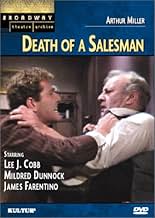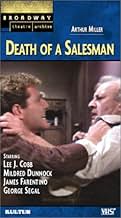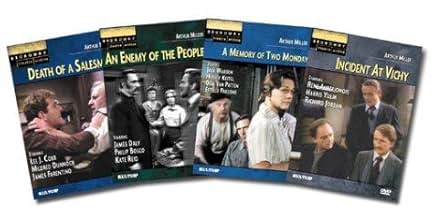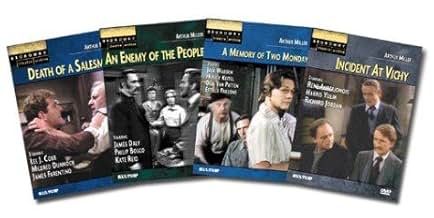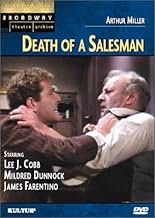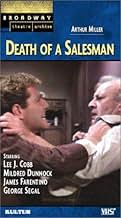Obwohl seine Frau ihn treu unterstützt, erträgt Willy nicht, daß seine Umsätze sinken. Sein neuer Boss will ihn loswerden. Und ein düsteres Geheimnis entzweit ihn und seinen hoffnungsvollen ... Alles lesenObwohl seine Frau ihn treu unterstützt, erträgt Willy nicht, daß seine Umsätze sinken. Sein neuer Boss will ihn loswerden. Und ein düsteres Geheimnis entzweit ihn und seinen hoffnungsvollen Sohn Biff. Doch Willy verdrängt alles.Obwohl seine Frau ihn treu unterstützt, erträgt Willy nicht, daß seine Umsätze sinken. Sein neuer Boss will ihn loswerden. Und ein düsteres Geheimnis entzweit ihn und seinen hoffnungsvollen Sohn Biff. Doch Willy verdrängt alles.
- 3 Primetime Emmys gewonnen
- 5 Gewinne & 8 Nominierungen insgesamt
Marc Fiorini
- Stanley
- (Nicht genannt)
Empfohlene Bewertungen
Willy Loman never realises until the end that he is a loser. Although his son Biff knows he himself is a loser, his father won't accept this. Son, Hap, like his father doesn't know he is a loser, either. Miller seems obliquely to imply that society is to blame for Willy's sad life. Maybe so, surely society doesn't cut him much slack, especially as represented by the son of his long time firm, for which he has been a fairly successful salesman much of his life. Whatever one's opinion on this subject, the play certainly portrays very genuine emotions and problems as the aging Willy more and more loses contact with reality and harkens back to nodal points in his life, especially contacts with his successful brother Ben. Or is Ben just a figment of his imagination. We can only guess. At the final funeral scene, Hap's losing philosophy continues. Could he and Biff take Willy's $20,000 insurance award and make it as ranching partners out west? We'll never know; Hap is determined to "make it big" in the Big Apple. Fat chance!
A better cast would be hard to imagine and the stage setting is beautifully photographed. The "fantasy" scenes are smoothly integrated with bits of "movie magic" that emulate what would be accomplished in the theatre with tricks of lighting. Cuts from the complete play are minor. This was TV at its best.
A better cast would be hard to imagine and the stage setting is beautifully photographed. The "fantasy" scenes are smoothly integrated with bits of "movie magic" that emulate what would be accomplished in the theatre with tricks of lighting. Cuts from the complete play are minor. This was TV at its best.
The only slight reservation I have about this TV version of the play is the fact that it was clearly shortened for the medium. The greatest thing about this recording is that it preserves Lee J. Cobb's interpretation of the lead role. I was enrolled in a drama school in the early 60s, a time when several of our teachers had actually seen him in the 1947 stage play. They would frequently speak, in reverent tones, of the scorching great performance that Cobb delivered. This 1966 television revival makes Cobb seem all the more remarkable to me due to the nearly twenty year interval that had passed since the New York run of the play. No matter how great a performance he might have initially delivered, many an actor would have lost a lot of the original intensity in that span. On top of this, Cobb had experienced a battering ordeal at the hands of the House on Un-American Activities Committee toward the end of the run of the play. There is a fascinating story behind Cobb's development of the role. During rehearsals, the director was considering replacing Lee, as his work was not showing promise. The story goes that, at a critical point, Cobb had been staring at a crack in a wall in the rehearsal space. Suddenly he was seized by a strong sense of the character which immediately endowed his reading with uncanny feeling and intensity. Late in the run, it is told that the characterization took such a pervasive hold on the actor that he started to take it home with him, unable to snap out of it.
Alex Segal and Lee J. Cobb leaves a piece of visual art for the ages with Segal's 1966 made for television version of Arthur Miller's play Death of a Salesman. Lee J. Cobb's exceptional turn as a salesman at the end of his rope, in more ways than one, is one that will stick with audiences long after the film's conclusion. Telling the all too relatable tale of the lack of control we all have over our lives is one which will strike a chord with audiences whether they are in the spring or autumn of their lives.
Willy Lowman (Lee J. Cobb) is a salesman relegated to the traveling circuit after a series of failures. In his 60's and tired Willy begins contemplating his life, both its successes and failures. He begins to get hung up on his failures and loses control of his life. When Willy's sons come home, be spirals even further into his failures as a father. Willy is constantly criticizing his son Biff (George Segal) claiming that he has yet to make anything of his life. His demure and obedient wife Linda (Mildred Dunnock) is constantly trying to both soothe Willy's doubts and support her sons. Ever nearing a nervous breakdown, Willy begins to relive each of his many personal failures, from the affair he committed against his wife, to the failed business decisions he made with his brother. The family is reeling from Willy's current business failures becoming behind on the final mortgage payment on their home. Dripping further and further into self-loathing, the Lowman family seeps to the pit of despair each wallowing in their various missteps in life.
Life is full of transition phases, and each member of the Lowman family was experiencing their own unique life transitions. The boys were transitioning into adulthood which oftentimes requires one to abandon the way you thought adulthood would be and embrace what it is. Willy is transitioning in his career, not being as needed in his sales industry like he once was. Linda is transitioning into the autumn of her life, as she has stopped coloring her gray hair and seems to be accepting her decline in years. Oftentimes as we transition in our stages of life, we attempt to assemble a sense of control over things that we truly have no control over. One cannot stop the hands of time, and with each passing year comes a new reality of life. The more we try to control our lives, like Willy did, the more we realize we have no control. Another unfortunate truth we learn with each successive stage in life is just how little freedom we have. For most of our lives, human beings are chained to jobs out of necessity to make money to survive. We spend our lives away at jobs just so we can pay to have somewhere to live, even though we never get to spend any time there because we are always working. Willy worked his whole life only to die before the final payment on his house was made. Willy's is the story of so many everymen, living life for someone else only to be supremely disappointed by its outcomes because we never get to live our lives for ourselves.
I watched this version of Death of a Salesman for Gene Wilder, although Lee J. Cobb is always a treat. It is disappointing to watch the earlier films in a favorite actor's filmography, as they are often only relegated to a handful of scenes. The few scenes Wilder was in were wonderful, and his gentle presence commanded the screen. He enjoys a powerful scene with Cobb in which he calls him to question what happened at what turned out to be a fateful meeting between him and his son. In spite of his minimal screen time, Gene Wilder was fantastic in the role of Bernard, Biff's tutor. I came for Gene Wilder, and stayed for Lee J. Cobb, and one can't really be disappointed about that.
Willy Lowman (Lee J. Cobb) is a salesman relegated to the traveling circuit after a series of failures. In his 60's and tired Willy begins contemplating his life, both its successes and failures. He begins to get hung up on his failures and loses control of his life. When Willy's sons come home, be spirals even further into his failures as a father. Willy is constantly criticizing his son Biff (George Segal) claiming that he has yet to make anything of his life. His demure and obedient wife Linda (Mildred Dunnock) is constantly trying to both soothe Willy's doubts and support her sons. Ever nearing a nervous breakdown, Willy begins to relive each of his many personal failures, from the affair he committed against his wife, to the failed business decisions he made with his brother. The family is reeling from Willy's current business failures becoming behind on the final mortgage payment on their home. Dripping further and further into self-loathing, the Lowman family seeps to the pit of despair each wallowing in their various missteps in life.
Life is full of transition phases, and each member of the Lowman family was experiencing their own unique life transitions. The boys were transitioning into adulthood which oftentimes requires one to abandon the way you thought adulthood would be and embrace what it is. Willy is transitioning in his career, not being as needed in his sales industry like he once was. Linda is transitioning into the autumn of her life, as she has stopped coloring her gray hair and seems to be accepting her decline in years. Oftentimes as we transition in our stages of life, we attempt to assemble a sense of control over things that we truly have no control over. One cannot stop the hands of time, and with each passing year comes a new reality of life. The more we try to control our lives, like Willy did, the more we realize we have no control. Another unfortunate truth we learn with each successive stage in life is just how little freedom we have. For most of our lives, human beings are chained to jobs out of necessity to make money to survive. We spend our lives away at jobs just so we can pay to have somewhere to live, even though we never get to spend any time there because we are always working. Willy worked his whole life only to die before the final payment on his house was made. Willy's is the story of so many everymen, living life for someone else only to be supremely disappointed by its outcomes because we never get to live our lives for ourselves.
I watched this version of Death of a Salesman for Gene Wilder, although Lee J. Cobb is always a treat. It is disappointing to watch the earlier films in a favorite actor's filmography, as they are often only relegated to a handful of scenes. The few scenes Wilder was in were wonderful, and his gentle presence commanded the screen. He enjoys a powerful scene with Cobb in which he calls him to question what happened at what turned out to be a fateful meeting between him and his son. In spite of his minimal screen time, Gene Wilder was fantastic in the role of Bernard, Biff's tutor. I came for Gene Wilder, and stayed for Lee J. Cobb, and one can't really be disappointed about that.
Just got this from Broadway Theatre Archive. I would recommend this to anyone remotely interested in this play and the history of American theater. While not the "film" the Dustin Hoffman version is, I found it more moving. It preserves two great performances, the original ones on Broadway. Lee J. Cobb is amazing. More than any other performance of this I've seen, he successfully shows Willy's horrifying diminishment in mental capacity while losing none of his character's or the play's emotional power. Mildred Dunnock is softer toward Willy than her successors but shows the steel within her when she deals with her sons. All in all a heartbreaking performance.
George Segal is good as Biff, but unlike the more evenly balanced Dustin Hoffman-John Malkovich version, is somewhat dwarfed by Lee J. Cobb's Willy. James Farentino, who made a superb Biff on Broadway with George C. Scott, makes a superb Hap.
George Segal is good as Biff, but unlike the more evenly balanced Dustin Hoffman-John Malkovich version, is somewhat dwarfed by Lee J. Cobb's Willy. James Farentino, who made a superb Biff on Broadway with George C. Scott, makes a superb Hap.
Clearly, "Death of a Salesman" is the best play that Arthur Miller has written. It is almost as if he wrote it with Lee J. Cobb in mind to play salesman Willy Loman. Lee J. Cobb (then 38 years old) had performed this role on Broadway starring in the original cast. The play ran for 742 performances from February 10, 1949 thru November 18, 1950.
I saw the television movie which ran on CBS television when it was broadcast in 1966. Back then we only had a black and white TV. Thirty-nine years later I purchased the DVD and marveled in seeing "Death of a Salesman" in color.
Sixteen years later a now 55 year old Cobb reprises his Broadway stage role for the television cameras and was emotionally and dramatically perfect. Cobb plays road salesman Willy Loman so well that the viewer can see him having an emotional breakdown as the play progresses to it's conclusion.
Part of the beauty of this television production is how it was video taped on a stage to resemble how an audience would see "Death of a Salesman" if it were being performed on the Broadway stage. The sets resembled those of a stage play. The only major difference is that, unseen by the viewers, the cameras were positioned to afford many dramatic angles and facial shots that could not be realized on a stage with a live audience.
The television movie co-stars Mildren Dunnock as Willy's wife Linda Loman. Ms. Dunnock was also in the original Broadway cast. Her dramatic and long suffering role as Willy's wife is played with emotion and genuine love for her salesman husband. I can never forget when she is scolding her adult sons for their lack of compassion to their father when she says, "....So attention must be paid. He's not to be allowed to fall into his grave like an old dog. Attention, attention must be paid to such a person."
George Segal turns in an excellent performance as Willy's son, Biff Loman, a son whom Willy had such dreams for Biff to be a college football star only to have a riff happen between Biff and his father. When Biff and Willy physically attack each other one can relate to real life when love covered over by hatred exists in real life families.
James Farentino plays the playboy son, Happy Loman who is a disappointment to Willy's dreams and his mother's respect for him. Farentino is well matched as Biff's brother and at times the two brothers reflect upon their youthful years when they were still in high school and the pride of their father's eye.
Gene Wilder (of Willy Wonka and Young Frankenstein fame) turns in a surprise performance at age 33 years old as Bernard the smart son of Willy's neighbor, Charley.
Veteran character actor Edward Andrews gives a fine performance as Charley. Maybe Charley is Willy's only true friend. Throughout the play, Charley tries shows genuine concern for Willy's predicament and tries to help him, to no avail, because Willy will not listen to Charley's wise counsel.
Albert Dekker plays Willy's older brother Ben. Ben is played as an hallucination. Ben's appears in Willy's mind dressed as a successful man who went away to make his fortune. Willy speaks to his brother as Hamlet spoke to his dead father and asks for Ben's advice on whether Willy has done right by his sons. Brother Ben's apparent success torments the mind of Willy.
Bernie Kopell plays Howard Wagner the heir and president of the Wagner Company that Willy has worked at for many years. Bernie Kopell went on to become well known as Dr. Adam Bricker in the TV series "The Love Boat" as well as being cast in many movies and TV series.
Character actor Stanley Adams has a small role as a waiter when Biff, Happy, and Willy meet for dinner. Up until his death in 1977 Stanley Adams appeared in roles in 65 motion pictures. Supporting roles were played by June Foray, Joan Patrick, Marge Redmond, and Karen Steele. At 88 years of age in 2005, June Foray continues to work in films doing cartoon voices. She is the voice of Rocky the Squirrel, Tweety Bird's Granny, and other various voices in 158 movie roles.
The dialogue written by Arthur Miller in Death of a Salesman is quite lengthy and difficult to perform by it's scope. Some passages delivered by Willy Loman comprise a whole page of dialogue. Biff, Happy, and Linda, likewise have dialogue segments of large paragraphs of speech.
I followed the TV play using the play script and did notice that some lines from the play script were omitted during the television production. Some lines were combined and rearranged for the benefit of keeping the camera on the speaker for continuity. Yet, in no way did this detract from the movement of the play.
Everyone who is a lover of good drama should find this DVD and enjoy what used to be the standard fare on television drama during the 1960s when great literary writings were presented to an appreciative audience much different than today's fast paced TV, remote control clicking audiences are now.
Death of a Salesman will keep you glued to your seat and you won't even think of going to the refrigerator for snacks. See this movie. It is a "10."
I saw the television movie which ran on CBS television when it was broadcast in 1966. Back then we only had a black and white TV. Thirty-nine years later I purchased the DVD and marveled in seeing "Death of a Salesman" in color.
Sixteen years later a now 55 year old Cobb reprises his Broadway stage role for the television cameras and was emotionally and dramatically perfect. Cobb plays road salesman Willy Loman so well that the viewer can see him having an emotional breakdown as the play progresses to it's conclusion.
Part of the beauty of this television production is how it was video taped on a stage to resemble how an audience would see "Death of a Salesman" if it were being performed on the Broadway stage. The sets resembled those of a stage play. The only major difference is that, unseen by the viewers, the cameras were positioned to afford many dramatic angles and facial shots that could not be realized on a stage with a live audience.
The television movie co-stars Mildren Dunnock as Willy's wife Linda Loman. Ms. Dunnock was also in the original Broadway cast. Her dramatic and long suffering role as Willy's wife is played with emotion and genuine love for her salesman husband. I can never forget when she is scolding her adult sons for their lack of compassion to their father when she says, "....So attention must be paid. He's not to be allowed to fall into his grave like an old dog. Attention, attention must be paid to such a person."
George Segal turns in an excellent performance as Willy's son, Biff Loman, a son whom Willy had such dreams for Biff to be a college football star only to have a riff happen between Biff and his father. When Biff and Willy physically attack each other one can relate to real life when love covered over by hatred exists in real life families.
James Farentino plays the playboy son, Happy Loman who is a disappointment to Willy's dreams and his mother's respect for him. Farentino is well matched as Biff's brother and at times the two brothers reflect upon their youthful years when they were still in high school and the pride of their father's eye.
Gene Wilder (of Willy Wonka and Young Frankenstein fame) turns in a surprise performance at age 33 years old as Bernard the smart son of Willy's neighbor, Charley.
Veteran character actor Edward Andrews gives a fine performance as Charley. Maybe Charley is Willy's only true friend. Throughout the play, Charley tries shows genuine concern for Willy's predicament and tries to help him, to no avail, because Willy will not listen to Charley's wise counsel.
Albert Dekker plays Willy's older brother Ben. Ben is played as an hallucination. Ben's appears in Willy's mind dressed as a successful man who went away to make his fortune. Willy speaks to his brother as Hamlet spoke to his dead father and asks for Ben's advice on whether Willy has done right by his sons. Brother Ben's apparent success torments the mind of Willy.
Bernie Kopell plays Howard Wagner the heir and president of the Wagner Company that Willy has worked at for many years. Bernie Kopell went on to become well known as Dr. Adam Bricker in the TV series "The Love Boat" as well as being cast in many movies and TV series.
Character actor Stanley Adams has a small role as a waiter when Biff, Happy, and Willy meet for dinner. Up until his death in 1977 Stanley Adams appeared in roles in 65 motion pictures. Supporting roles were played by June Foray, Joan Patrick, Marge Redmond, and Karen Steele. At 88 years of age in 2005, June Foray continues to work in films doing cartoon voices. She is the voice of Rocky the Squirrel, Tweety Bird's Granny, and other various voices in 158 movie roles.
The dialogue written by Arthur Miller in Death of a Salesman is quite lengthy and difficult to perform by it's scope. Some passages delivered by Willy Loman comprise a whole page of dialogue. Biff, Happy, and Linda, likewise have dialogue segments of large paragraphs of speech.
I followed the TV play using the play script and did notice that some lines from the play script were omitted during the television production. Some lines were combined and rearranged for the benefit of keeping the camera on the speaker for continuity. Yet, in no way did this detract from the movement of the play.
Everyone who is a lover of good drama should find this DVD and enjoy what used to be the standard fare on television drama during the 1960s when great literary writings were presented to an appreciative audience much different than today's fast paced TV, remote control clicking audiences are now.
Death of a Salesman will keep you glued to your seat and you won't even think of going to the refrigerator for snacks. See this movie. It is a "10."
Wusstest du schon
- WissenswertesIn his autobiography "Timebends", Arthur Miller said that Lee J. Cobb was his favorite Willy Loman.
- VerbindungenFeatured in Role Model: Gene Wilder (2008)
Top-Auswahl
Melde dich zum Bewerten an und greife auf die Watchlist für personalisierte Empfehlungen zu.
Details
- Erscheinungsdatum
- Herkunftsland
- Offizieller Standort
- Sprache
- Auch bekannt als
- La muerte de un viajante
- Drehorte
- Produktionsfirma
- Weitere beteiligte Unternehmen bei IMDbPro anzeigen
Zu dieser Seite beitragen
Bearbeitung vorschlagen oder fehlenden Inhalt hinzufügen


